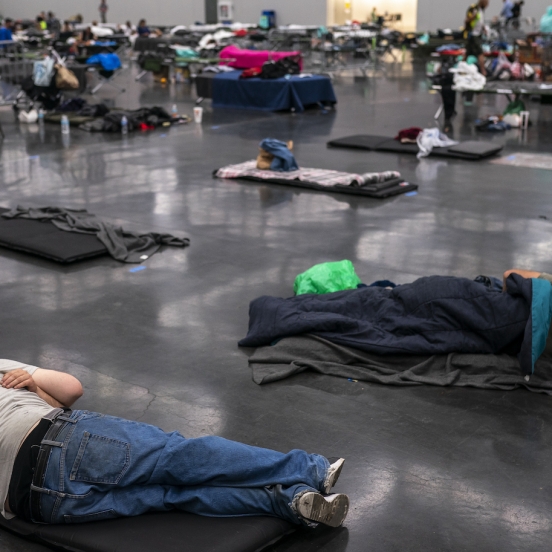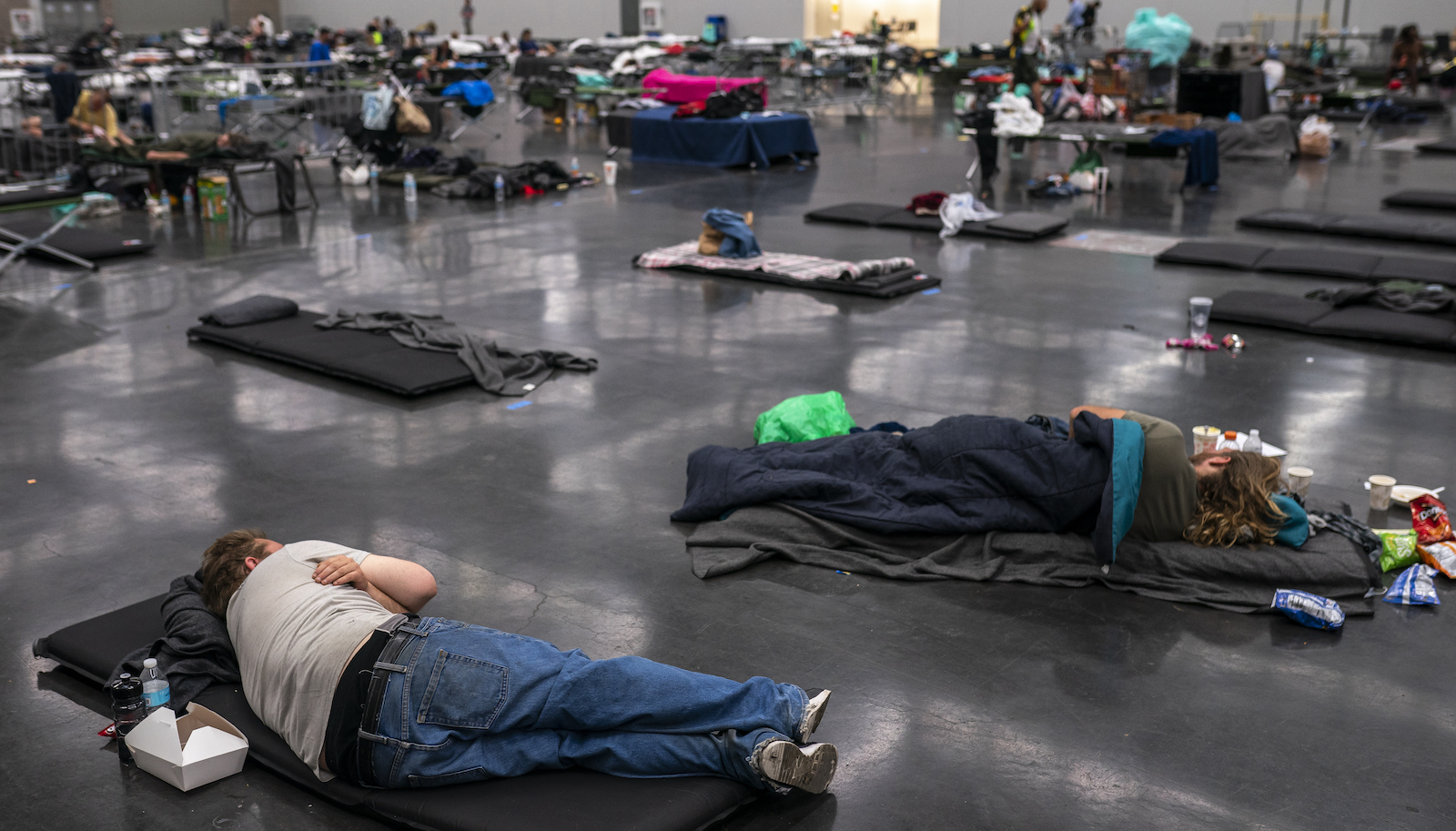Climate, Health and Equity Brief
Deadly heat, devastating floods and climate denial
July 6, 2021

The Climate, Health & Equity Brief is GMMB’s take on the week’s news on the current impacts of climate change. If you haven’t subscribed yet, you can do so by clicking here.
Hot Topic: Climate extremes. On the heels of record-setting temperatures that ravaged parts of the Western U.S., an unprecedented heat wave overwhelmed the Pacific Northwest and Western Canada this week. Officials have reported a staggering 586 sudden deaths as a direct result of the heat—nearly all of which are attributable to hyperthermia, heatstroke, heat exhaustion or dehydration. Hospitals in the region are also seeing a record number of emergency visits; the city of Seattle reported nearly 700 heat-related emergency room visits last Monday alone.
Scientists confirm that the intensity and frequency of heat waves are being exacerbated by planet-warming emissions. Just two decades ago, researchers openly hesitated to link extreme heat to climate change in any way, but now they say the burden of proof is on scientists to prove that human-induced climate change does not play a role.
And blazing heat is not the only extreme climate impact to wallop the U.S. in recent days. Severe storms battered the Detroit area over the weekend, inundating the city with seven inches of rain in just five hours, causing flash floods that damaged major highways and flooded homes and businesses.
Despite the extremes that continue to take human lives, ExxonMobil and the U.S. Chamber of Commerce were both in the hot seat this week for their efforts to undermine climate science. A senior director of federal relations for ExxonMobil was recorded describing the company’s efforts to thwart President Biden’s climate goals and fund “shadow groups” to work against climate science. And an investigation into the U.S. Chamber of Commerce found that the organization has been “a central actor in the national and global countermovement against ambitious action on climate change,” with ties to several major campaigns to stop national and international climate policies. If we are to protect the well-being of the Earth and its people, urgent and significant actions from government and corporate leaders must replace the climate-denying efforts of major organizations that put the future of the planet in peril for the sake of profit.
— Matt & Traci, GMMB
Human Health
Last weekend’s extreme heat wave has caused at least 563 deaths so far, with Canadian officials reporting over 486 sudden death calls over the weekend and officials in Oregon and Washington citing hyperthermia as the cause of death for 77 residents. (The New York Times and CNN)
Historic storms battered the midwest this week, including the city of Detroit, which saw seven inches of rain in one night—a 1-in-500-year weather event that closed portions of roads for days and left about 1,000 cars submerged or abandoned. (Gizmodo)
As heat waves grow more extreme and people seek relief from the rising temperatures, the number of air conditioners is expected to increase by two-thirds by 2030, threatening to further increase planet-warming emissions. (Axios)
Planetary Health
Amidst a “1,000-year” heat wave in the Pacific Northwest, scientists say that when it comes to the connection between climate and extreme heat, the burden of proof is now to show that climate change does not play a role in such weather events. (Grist)
A new analysis revealed that aging oil wells in the U.S. leak seven million metric tons of methane into the atmosphere every year, raising concerns about the dangers that abandoned wells pose to the environment by making some lands “functionally uninhabitable.” (Bloomberg)
What we do to the environment we ultimately do to ourselves.”
-Ian Somerhalder
Equity
The EPA announced $50 million in funding for environmental justice initiatives in low-income communities and communities of color, including education on the health impacts of pollution and training community members for jobs in the environmental industry. (Buzzfeed News)
For the first time, the Department of Transportation included criteria on how infrastructure projects would tackle climate change and racial injustice in applications for grants from a $900 million dollar fund. (The Washington Post)
Forced to relocate to “the most undesirable areas of America” by white settlers and U.S. government policies in the 1800s, Native Americans are facing the loss of home once again as climate change threatens their lands, food systems, and water supplies. (The New York Times and World Economic Forum)
Monroe County in the Florida Keys is struggling to find a way to pay for a $1.8 billion dollar road elevation project that will be necessary to avoid “perpetual flooding” caused by rising sea levels, potentially leading to some predominantly Latinx and lower-income neighborhoods to be lost to the rising seas. (The Guardian)
The EPA announced $50 million in funding for environmental justice initiatives in low-income communities and communities of color, including education on the health impacts of pollution and training community members for jobs in the environmental industry. (Buzzfeed News)
For the first time, the Department of Transportation included criteria on how infrastructure projects would tackle climate change and racial injustice in applications for grants from a $900 million dollar fund. (The Washington Post)
Forced to relocate to “the most undesirable areas of America” by white settlers and U.S. government policies, Native Americans are facing “the loss of home once again,” as climate change threatens their lands, food systems, and water supplies. (The New York Times and World Economic Forum)
Monroe County in the Florida Keys is struggling to find a way to pay for a necessary $1.8 billion dollar road elevation project to avoid “perpetual flooding” caused by rising sea levels, potentially leading to some Latinx and lower-income neighborhoods to be lost to the rising seas. (The Guardian)
Politics & Economy
A senior director of federal relations for ExxonMobil was recorded describing the company’s efforts to thwart President Biden’s climate goals and fund “shadow groups” to work against climate science. (The New York Times)
A new report finds that the U.S. Chamber of Commerce has downplayed the threat of climate change and countered efforts to reduce greenhouse gas emissions, including persuading President Bush to withdraw from the Kyoto Protocol and helping lead an organization that fought President Obama’s Clean Power Plan. (InsideClimate News)
A senior Defense Department official said more frequent natural disasters caused by climate change are a threat to national security, as they contribute to instability, increase the risk of conflict and increase operational demands on the U.S. military to provide assistance during disaster relief efforts. (Forbes)
Action
Oregon legislators approved one of the most ambitious state plans for a zero-emission power grid by 2040, banning the expansion of fossil fuel power plants, setting labor standards for large energy projects, and providing grants for renewable energy projects led by cities. (Oregon Public Broadcasting)
The European Union voted to approve making greenhouse gas emission targets legally binding, a major win in the policy arena for combating climate change, requiring a cumulative 55 percent emissions reduction by 2030—and total elimination by 2050—across the 27 countries that make up the EU. (U.S. News)
Bangladesh has canceled plans for at least 10 coal-fired power plants in pursuit of renewable energy, aiming to reach 40 percent of power production from renewable energy sources by 2041. (Tech Xplore)
Kicker
Fact: Did you know that Americans start a reported 19,500 fires each year from fireworks? With much of the country in drought and wildfire risk exceptionally high, please be mindful and safe this weekend!
The GMMB Climate, Health & Equity Brief would not be possible without the contributions of the larger GMMB California team—Aaron Benavides, Elke Cortes, Stefana Simonetto and Sydney Lykins. Feedback on the Brief is welcome and encouraged and should be sent to CHandEBrief@gmmb.com.






